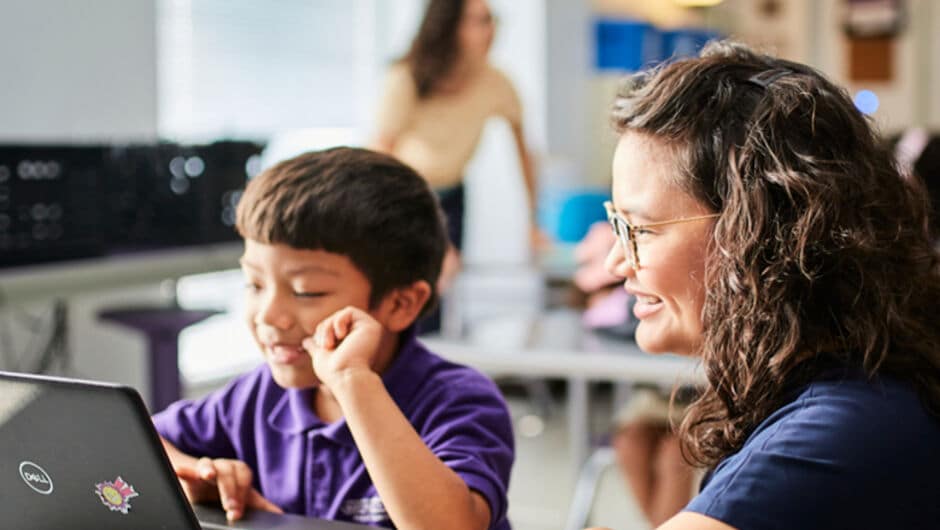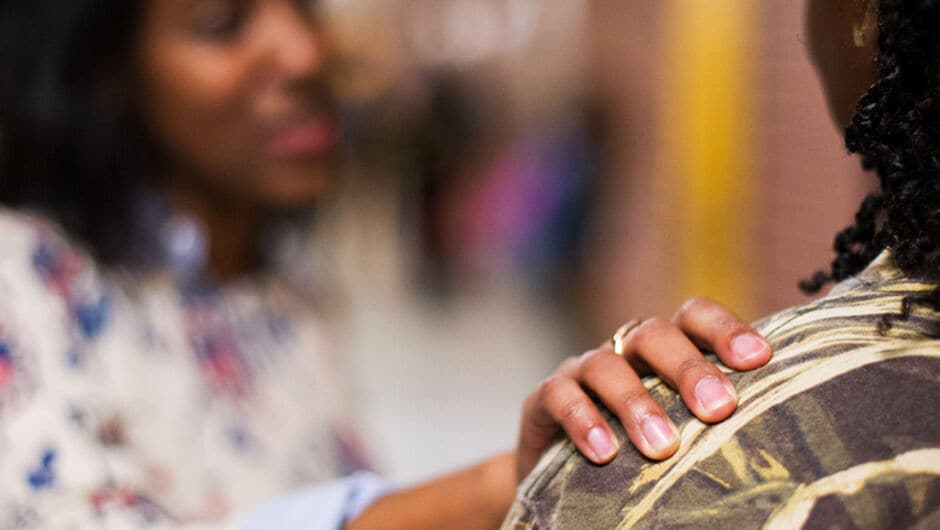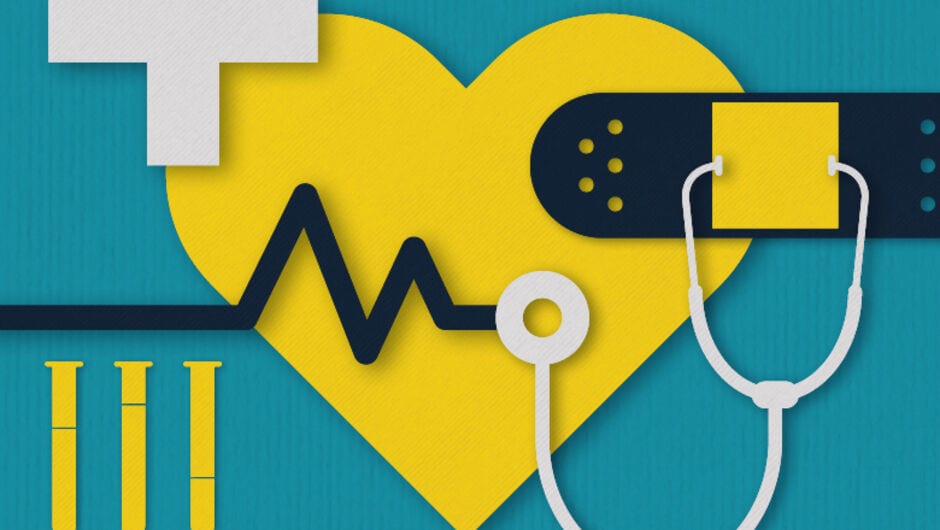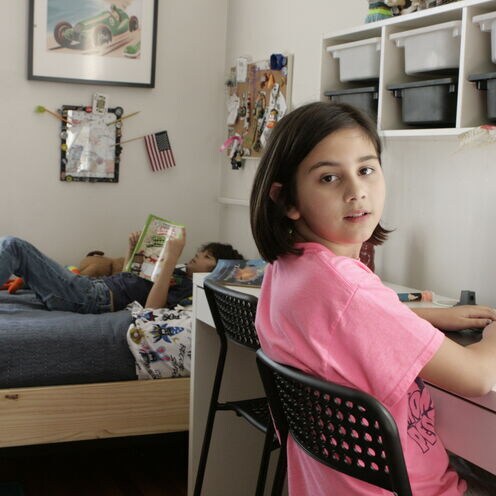
This Family Has Quickly Adapted to a New Routine
While fourth grader Judah would prefer to return to school, her father sees bright sides to at-home education.
Judah is 10 years old, and in fourth grade at Lafayette Preparatory Academy (LPA) in St. Louis, Missouri. After spring break, her school never reopened. Now, along with Soren, her 8-year-old brother, who is also an LPA student, Judah is attending classes from her home, with help from technology like Zoom and Google Classrooms.
For the latest installment of our "COVID-19: Community Voices" series, we spoke with Judah and her dad, Matthew, who works as a psychiatric nurse, about the family’s new routine. (Matthew asked for us not to use the family's last name.) As Matthew is quick to point out, their family is fortunate: LPA was well prepared for the shut-down, he and his wife are still employed, the family has ready access to technology, and the kids are handling the transition well. Still, even with all the new freedom over her schedule, Judah would opt to return to the classroom if she could.
Judah: “I Would Choose to Go Back to School”
What’s your routine like now?
Instead of having to wake up early, we get to choose when we wake up and then we eat breakfast, get dressed, and all that. Then we look at our schedule, because our teacher prints a schedule, and see what we have to do today, and then we could choose what we do first.
We have Zoom morning meetings, and then we have office hours with our teachers, which is basically, if we have a question about anything like what we need to do, we just go to their office hours on their computer, and then we can Zoom them and ask them a question.
If it's a weekday, we're not allowed to watch TV. Usually I’ll play with my brother. We like going biking in the alley, sometimes we could just do Zoom with friends. It's pretty fun when we don't have to do anything.
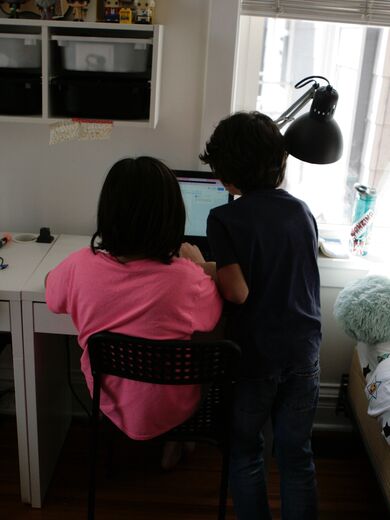
Do you find it hard to attend school from your home?
It's not hard because the work they send is at all our classmates’ and our own level so it's not hard for some people, easy for others. [All you have to do is] just type an answer on a computer and then submit it in your Google Classroom. I like that sometimes we finish early, and we don't have to do anything and sometimes we can work late and get all our stuff done pretty easy and spend more time on it.
Do you miss your friends?
Sometimes. Sometimes we can do Zoom with them if we want to. Then we can share screens, and someone would do a game, and we can watch them play. Usually we're like, "How are you doing?" or we’ll share or something that's happened this week, something like that.
What’ll you miss if school’s out the rest of the year?
I would miss having field day, and we did this thing called spirit weekends, it's like where you can wear your PJ's, dress in wacky stuff like, we're doing virtual right now this week, so if it kept going then I'd miss field day and the talent show and stuff like that.
If you could, would you choose to go back to school or continue school at home?
I would choose to go back to school because I just feel like I like interacting with other people while I'm doing school and I just like having an organized order and being able to ask questions anytime to my teacher.
Matthew: “I Feel Very Blessed”
How did the school handle communications?
Before spring break, when there was a general awareness of COVID-19, all the teachers had reached out to parents and said, "Hey, we've prepared two weeks of work just in case. We all plan to come back after spring break, but just in case here is two weeks of work." They had done all of the curriculum building and built the online space as well for the kids. Then as spring break came to an end, they said, "Yes, turns out we're not coming back."
For us, we're fortunate that we have technology in our home. We have access to Wi-Fi, we have computers, tablets. It was a very plug-and-play experience in that they had done the building of it, they had communicated, and then we were able to just start going. Beyond that, the school was also communicating like, "Hey, if you don't have tablets, if you don't have access to computers with a printer, we've got everything you need, you need to call us and let us know if you're going to come to pick it up. Here's our scheduled times."
I would say you're getting used to like, "Okay, my son's using a program called Seesaw, and my daughter's using Google Classroom." Each of them are a little finicky in their own ways, but the teachers were so on it. One time my daughter had missed an assignment. It wasn't due yet, but the teacher texted my wife and I directly to check in.
The teachers are doing these morning meetings where they check in with the kids to see how they’re doing. The kids get to do their show and tell still. They've made it so it wasn't as bad as I think has been for many people, or as bad as it could have been. Communication makes all the difference, and preparation makes all the difference.
What’s it been like having the kids at home?
For us, it's been really smooth. Our kids have tolerated it really well. They've adapted to using the Zoom classroom experience. They spend time with their classmates in a morning meeting, if not daily, a couple of times a week.
My wife and I both think that their behavior has improved significantly. I think that's because the day is spread out so it's not like we're rushing in the morning to get them [to school] and then make sure they're getting to their extracurriculars, and then they're going to do their homework and then we're getting dinner and a bath and then wind down time. For us, we've observed that we feel more relaxed in this experience and I've really enjoyed it.
It's also made my wife and I much more acutely aware of what the kids are doing in school. We were already involved and followed up with teachers regularly, but now it's like we're sitting next to our kids watching them do the classwork. We get the opportunity to really get a sense of like, "Okay, here's how your mind is working through this and this part is more stressful for you than this part. Maybe we just tweak this a little bit." I think it's made us much more intentionally involved in their day-to-day class experience, which has been nice for us.
Do you have any concerns?
Look, if my child was a senior in high school and they were missing out on major life experiences, totally different perspective. But I have a second-grader and a fourth-grader, and they're very much in your normal transitional classrooms. For me, it's nice to have them around more at this age and be able to spend that time with them. I'll be out in the backyard doing something and my daughter comes out and we can do a recess type of thing together. That's just an experience I wouldn't have had otherwise in our typical day-to-day.
In terms of education, I don't feel like there's been a decline. My kids are still doing the coursework. The school is very proactive. Again, I feel very blessed. LPA has done a better job of communicating and being prepared than my graduate school and my place of employment.
Have you found anything surprising?
Maybe the biggest surprise for my wife and I was how much, for our children, just seeing them much more relaxed and maybe that was us feeling less like, "Well, now we have to get these seven things done tonight." Certainly, it's changed the nature of our household and the pace of our household and I consider it with those things and moments of crisis or stress, you have an opportunity for growth and change, and for us, I've seen positives.
My kids both want to go back to school, they miss their friends. I think they're both like, "This is boring. This sucks." From a parent's perspective also being in the position we're in, it's been not stressful, I would say.
I think that reinforces to me family time and downtime is a thing in itself that counts and that's significant and it really goes a long way in terms of helping kids feel safe and loved and being confident individuals. Maybe spending time with people who love you and stretching out that time and just learning how to be yourself and feel comfortable with everyone around you is a great thing on its own and you're not short-handing them or shorting them of an important life experience.
More Community Voices
“COVID-19: Community Voices” offers a glimpse of life and learning during the coronavirus school closures, in the words of students and parents in the communities we serve. Read other stories in the series:
- Lifeguarding Dreams Put on Hold by the Pandemic
- ‘I’m Ready to Go Back to School’
- Enjoying Time Together, Despite This 'Nightmare'
- How These Film Students Look at COVID-19 Through a Different Lens
If you'd like to tell your story or would like to suggest a story for us to cover, please email us. And find resources for educators supporting students through the coronavirus outbreak at Teach For America's educator resource hub.
Sign up to receive articles like this in your inbox!
Thanks for signing up!
Content is loading...




